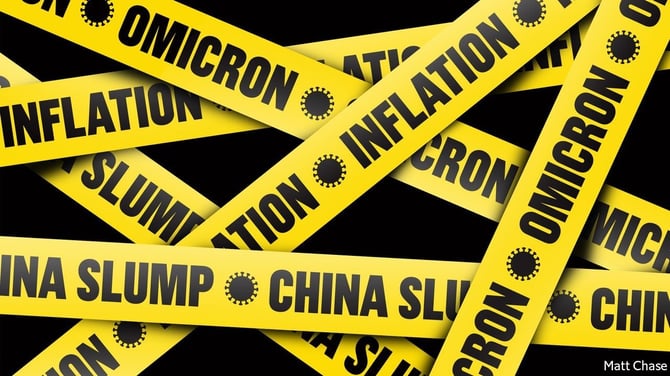Omicron Puts the Skids on the Global Economy

Fears over the growing threat of the COVID-19 Omicron variant have started to creep into stock market performances around the world.
After Monday’s trading, the Dow Jones fell by 1.2%, continuing a downward trend that saw it lose 1.5% last week. Meanwhile, the S&P 500 slid by 1.1% and the Nasdaq also dropped by 1.2%.
Major stock markets in Europe finished the day’s trading about 1% lower. At the same time, many Asian markets suffered larger drops, except for the Shanghai Composite, which was buoyed by news of a Chinese interest rate cut.
Rising Omicron case numbers in the US and Europe are forcing governments to increase restrictions on movement at the worst possible time of the year for retail businesses.
The US faces a double whammy with the prospects of an economic resurgence dimmed after Democrat Senator Joe Manchin announced he would not support President Biden’s all-important $1.75 trillion “Build Back Better” bill.
What does this mean for me?
As a stock trader, knowing what questions to ask after important global events impact your portfolio is an important skill to learn. Is this collective market unease, a temporary dip, or a sign of deeper trouble?
Previous Coronavirus variants have come and gone, so it is important to decipher what is a short-term headwind and what is a longer-term underlying problem.
By keeping a close eye on interrelated market events like the Omicron variant, the oil price, and the impact of inflation on consumer prices, you can make better-informed decisions.
More News

Wall Street Rallies as the S&P 500 Pushes Deeper Into Record Territory

Novo Nordisk Shares Soar as FDA Clears First Weight-Loss Pill

From Comeback to Contender: Can Europe’s Banks Deliver Again in 2026?

Oracle’s Miss Stirs Fresh AI Bubble Jitters

Netflix’s $72bn Power Play Sets Up a Streaming Shockwave

HP Bets on AI as Cost Pressures Mount and Layoffs Deepen

SoftBank Cashes Out of Nvidia to Double Down on AI Bets
